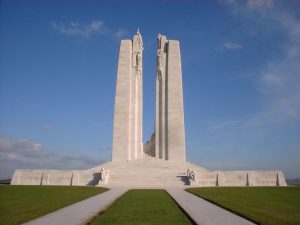If you have read other posts you should know that I have a post that I made not too long ago about how the First World War started. Naturally when you learn about how something starts you most likely will learn about what happened during it. We learned about how technology changed so much during WWI. Like one thing that was new for warfare with foot soldiers was gas, the Germans used it quite a lot and it was very effective. Another new technology on land were tanks as they were basically giant metal boxes that killed people at the time, they have become much more effective now but back then they still played a major part in the war. In the ocean german U-boats hugely effected the war as they killed many people who were on war ships and just people who were on supply ships. In the air plane warfare changed hugely as planes were mainly used at the beginning of the war for scouting the enemy lines. Planes ended up developing to the point where they had small machine guns attached to them so they could have dog fights and drop bombs as well.
We then talked about the battles in the First World War like, The Somme, Ypres, Vimy Ridge, Passchendaele. We mainly focused on the Canadian aspect of it. We learned the basics of each war and how greatly it impacted each country and the contribution each battle had to the war. In all of these wars many people died on both sides of the war. One battle that was huge for Canadians is Vimy Ridge. We focused on that quite a bit as it is a huge part of Canadas identity. At Vimy Ridge all other forces attacked before the Canadians and were basically wiped out. It was finally Canadas turn to attack and it was their first time fighting together with all 4 divisons. After it was over the Canadians had over come the Germans and taken the ridge. Canadians are known has heroes for that battle and their is a big memorial at vimy ridge today of all the Canadians that lost there lives in that battle.
We then focused on what life on the home front was like, so basically what life at home was like when people were off at war. Most of the time when you think of war you think of troops fighting, but there is another side of it which is the people haveing to fill in for those people who left their jobs behind. A lot of women took primarily male jobs, as primarily males left for the war. People even made victory gardens to make more food for troops. After the war was over women were expected to go back to their original jobs as otherwise the troops that survived.
The next thing in this unit that we learned about was the Halifax Explosion. It is the biggest man made explosion before the Nuclear Bomb. It killed many people and one persons muscles on his arm were ripped clean off. It was a massive disaster as many people died who were in that port at the time.
While we learned about all of this we were working on the main project for this unit which is a podcast on a soldier. We had to pick a soldier that fought in the First World War, and find as much information on him as possible. I chose my Great Grandfather Charles Brudenal Johnston. He is from my fathers side so I asked my great aunt question about him to figure out as much information on him as possible. The most notable thing I found out is that he fought and survived in Vimy Ridge. We did two drafts, the first draft that I did was fairly good but of course needed improvement, and thats what I did for the second draft was improve everything I could possibly think of.
That is my first draft and here is my final draft.
That is what I learned about for my unit on WWI, I hope that I made it interesting in someway for you.
I learned a lot from this unit. Even if I already knew something we went into more depth on that subject. This was definitely a more interesting unit for me, as I find battles and wars very interesting to learn about. This is definitely a unit I won’t forget about.



